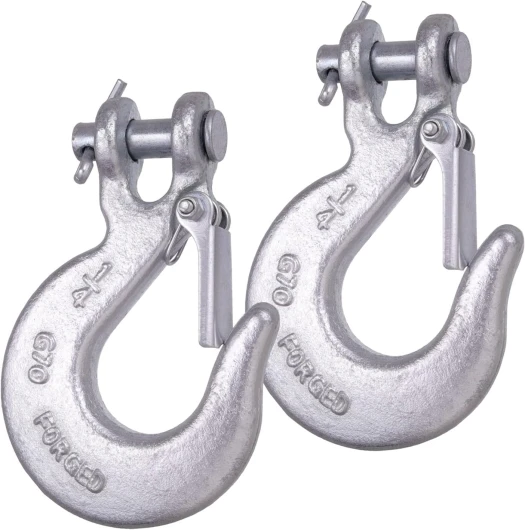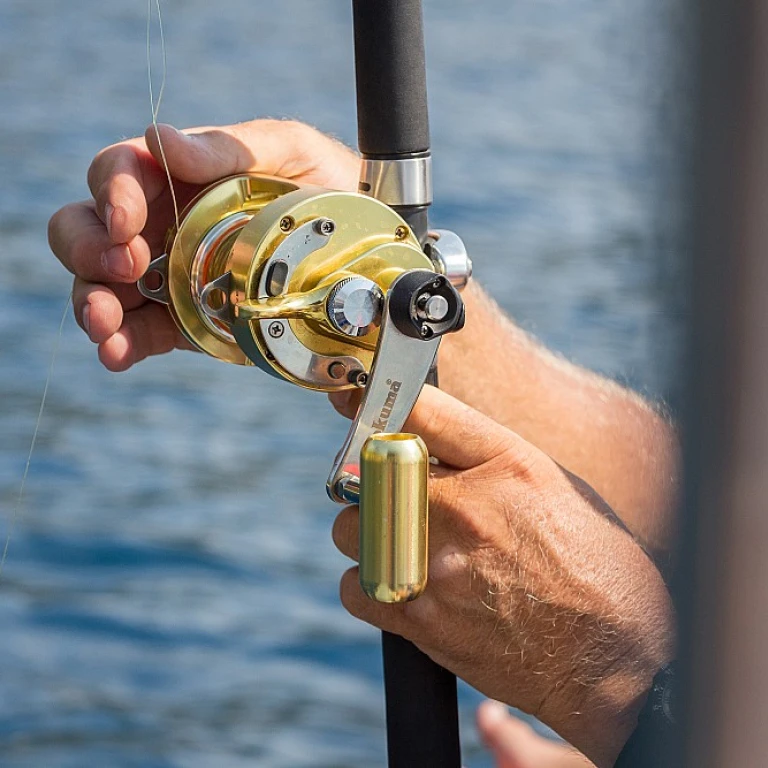Understanding Tow Chain Hooks
Unraveling the Mystery Behind Tow Chain Hooks
Tow chain hooks, despite their utilitarian appearance, hold immense potential in the realm of recreational fishing. Understanding the design and function of these integral components can dramatically enhance your fishing experience.
Tow chain hooks are essentially robust connectors that are vital for the secure transport and towing of heavy loads. They are commonly crafted from forged materials, which ensures durability and strength. A key attribute of these hooks is their ability to withstand significant working loads—often rated in thousands of pounds (lbs). They come in various grades, indicating their strength and suitability for specific tasks, with the heavy duty options being particularly favored in fishing setups.
Forged hooks, slip hooks, and grab hooks are among the most popular types you'll encounter in the fishing niche. The chain grade is another critical aspect to consider; a higher grade typically means stronger chains, offering greater load limits. Whether you're utilizing them for towing your boat, securing your trailer, or even in various adaptations during your fishing trips, the versatility of these hooks is truly remarkable.
Interestingly, tow chain hooks have transcended their original purpose. Their standard application in transport and towing has expanded into recreational contexts, where anglers find them useful beyond mere load-bearing tasks. With options like ratchet straps and trailer safety chains, these hooks are contributing to safer and more efficient fishing expeditions. They are not just about towing; they are a valuable addition to any angler's arsenal.
To familiarize yourself with the broader implications of using such equipment, it's beneficial to understand complementary fishing gear. A thorough understanding of essential equipment can significantly enhance safety and performance in your fishing endeavors. For more insights, refer to this
essential resource.
The utility of tow chain hooks in fishing highlights a need for awareness and care, which we'll explore further along with tips for selecting the right hooks and maintaining their condition.
Benefits of Using Tow Chain Hooks in Fishing
Advantages of Integrating Tow Chain Hooks in Fishing Activities
Tow chain hooks offer a multitude of benefits that can enhance your fishing experience. These versatile tools are often underappreciated, yet they prove invaluable in various situations encountered by recreational fishermen.
- Strength and Durability: With high-grade chains and forged hooks, these tools can withstand substantial weight, providing a reliable working load capacity. Many tow chain hooks boast an impressive break strength, making them ideal for dragging and retrieving heavy catches and equipment.
- Multi-Functional Use: Their diverse applications go beyond the regular fishing scenarios. For instance, hooks like the grab hook and slip hook help in stabilizing gear and securing loads efficiently, ensuring that everything is safely transported to and from the fishing site.
- Cost-Effective Solution: Tow chain hooks fall within a range of price options. Whether you are looking for a regular price or a chain hook on sale price, there are various options available that can meet your budget without compromising on quality.
- Enhanced Safety Features: Safety remains paramount, and the incorporation of a safety chain, trailer safety devices, and ratchet straps offers added security. This ensures hooks stay in place, reducing the risk of untoward incidents during towing and transport.
These features make tow chain hooks an indispensable part of any fishing gear. Moreover, their utility extends beyond traditional uses, proving beneficial across various fishing activities. To explore more ways these tools can be employed, check out this
versatile fishing tool and enhance your fishing toolkit effectively.
Selecting the Right Tow Chain Hooks for Your Needs
Choosing the Ideal Chain Hook for Your Needs
Selecting the right chain hook for your recreational fishing activities is crucial to ensure both safety and efficiency. With various types and grades available, it’s essential to identify what best suits your specific needs. Here’s a quick guide to help you make an informed decision.
- Understanding Grades: The grade of the chain or hook generally indicates its strength and load-bearing capacity. For instance, a higher grade chain would be durable enough for towing and handling heavy loads, sometimes reaching up to thousands of lbs. It is wise to opt for a higher grade chain hook if you're undertaking heavy-duty tasks, ensuring they meet the working load limit requirements.
- Determining the Type: The type of hook matters a lot in recreational fishing. A forged hook offers greater durability and resistance compared to regular hooks. Whether it's a grab hook or a slip hook, their unique designs cater to different functions. A grab hook, for example, is excellent for securing loads without allowing the chain to slip, while a slip hook might provide more versatility in adjusting the chain’s positioning.
- Compatibility: Ensure that your chosen chain hooks are compatible with your existing equipment. This includes checking the chain size, typically measured in inches, and ensuring it fits snugly within the eye of the hook. Compatibility plays a key role in maintaining the integrity of the safety chain or trailer safety setups.
- Budget Considerations: The price of chain hooks can vary, with the regular price ranging based on their material and grade. Consider any sale price offerings which might allow you to acquire higher-grade chain hooks at a more accessible cost.
When selecting chain hooks, always prioritize safety features, such as a properly rated clevis for trailer attachments and ensuring the break strength aligns with your target load limit. This careful selection process will enhance your fishing experience and ensure you’re equipped for whatever the adventures at sea may bring.
Innovative Uses of Tow Chain Hooks in Fishing
Expanding the Utility of Tow Chain Hooks
Tow chain hooks are often associated with heavy-duty tasks like towing and transport, but their potential exceeds beyond just these uses. Innovative recreational fishermen have discovered numerous unconventional applications for these sturdy pieces of fishing equipment. Here’s how you might expand the utility of tow chain hooks in your fishing adventures:
- Trap Anchoring: Whether you're setting crab traps or aiming for larger prey, a forged hook or a clevis can serve as an effective anchor point. With a strong chain hook, you're ensured that the traps will stay in place, resistant to tidal washes and curious wildlife.
- Rigging Support: Using safety chain setups, you can create complex rigging systems to support heavy loads on your boat. By incorporating grade chains with high working load limits, your setup can withstand substantial lbs without falter.
- Assist in Load Handling: When it comes to handling your catch or transporting heavy gear, slip hooks and grab hooks come to the forefront. These can be instrumental in maintaining tension or securing cargo, akin to using ratchet straps, providing you with the assurance of safety and efficiency.
- Adapt for Variable Conditions: The adaptability of tow chains makes them suitable for varied marine conditions. Choose a forged chain hook for added durability, especially when facing harsh weather that necessitates reliable equipment.
The market offers a plethora of price points, allowing you to choose between sale price and regular price options that suit your budget. Equipped with these insights on utilizing tow chain hooks, anglers can effectively elevate their fishing expeditions to new heights.
Safety Tips When Using Tow Chain Hooks
Prioritizing Safety with Tow Chain Hooks
Ensuring the safety of everyone on the water is paramount when using tow chain hooks in recreational fishing. These seemingly simple tools, such as grab hooks and slip hooks, play crucial roles in towing and transporting loads with ease. However, their effectiveness can only be maximized when safety is prioritized. Here are some key safety tips for using tow chain hooks effectively:
- Understand the Working Load Limits: Always pay attention to the working load limits (WLL) specified for each hook and chain. Exceeding these limits can result in failure, risking equipment damage and personal injury. For instance, a heavy-duty chain with a load limit of 5,000 lbs should never be used to tow or transport more than its specified strength lbs.
- Regular Inspections: Make it a habit to inspect your tow chain hooks and chains for any signs of wear or damage. Look for rust, deformation, and worn-out chains that could compromise safety. Chain hooks that are in poor condition should be replaced immediately to maintain safety standards.
- Proper Hook Usage: Ensure the right type of hook, be it a clevis or a forged hook, is used for the task. Position hooks properly and make sure that they are fully engaged, avoiding any side loading that can lead to accidental releases. Grab hook and slip hook should be used as per their designed application to prevent mishaps.
- Utilizing Safety Chains and Ratchet Straps: Complement your tow chain hooks with additional safety measures such as trailer safety chains and ratchet straps. Utilizing these items adds an extra layer of security, reducing the risk of detachment during transit.
- Be Mindful of the Environment: Conditions such as rough waters or strong winds increase the stress on chains and hooks. Each angler should adjust their equipment usage accordingly, taking environmental factors into account. Transport your loads only when conditions are suitable to maintain safety.
Adhering to these guidelines ensures that your fishing trips remain enjoyable and accident-free. Safety should never be compromised, so continue to follow best practices and embrace regular maintenance for optimal performance.
Maintenance and Care for Longevity
Maintaining Chain Hooks for Optimal Performance
Regular maintenance is crucial to ensure the longevity and effectiveness of your tow chain hooks in recreational fishing. Here's how you can keep your hooks in top condition:
- Inspection: Routinely check your chain hooks for any signs of wear or damage. Look for any deformation in the grab hook, slip hook, or clevis connections. Pay close attention to the hooks' surfaces and joints where rust and fatigue are more likely to occur.
- Cleaning: After each use, especially in saltwater conditions, thoroughly rinse your hooks and chains with fresh water to remove any salt or debris. This practice will prevent corrosion and prolong the lifespan of your equipment.
- Lubrication: Apply a light coat of lubricant on the moving parts and connections of the tow chain to mitigate friction and reduce the potential for rust. Regular lubrication aids in maintaining the proper working load limit.
- Storage: Store your chains and hooks in a dry place out of direct sunlight. Proper storage prevents unnecessary wear from environmental elements and maintains the forged hook's structural integrity.
- Load Testing: Periodically test the load capacity of your chain hooks, especially if you frequently tow or transport heavy loads. This ensures that the hooks maintain their rated break strength and can handle the intended load lbs safely.
- Replacement: Consider replacing components like the chain or clevis that show noticeable wear or compromised integrity. A broken safety chain or compromised hook grab can lead to failure during critical moments, risking damage or injury.
Following these maintenance steps will not only enhance the performance and safety of your tow chain hooks but also offer a cost-effective way to avoid frequent replacements, saving you on the regular price or any potential sale price expenses. Remember, keeping safety and care at the forefront will boost the overall success and enjoyment of your fishing adventures.




